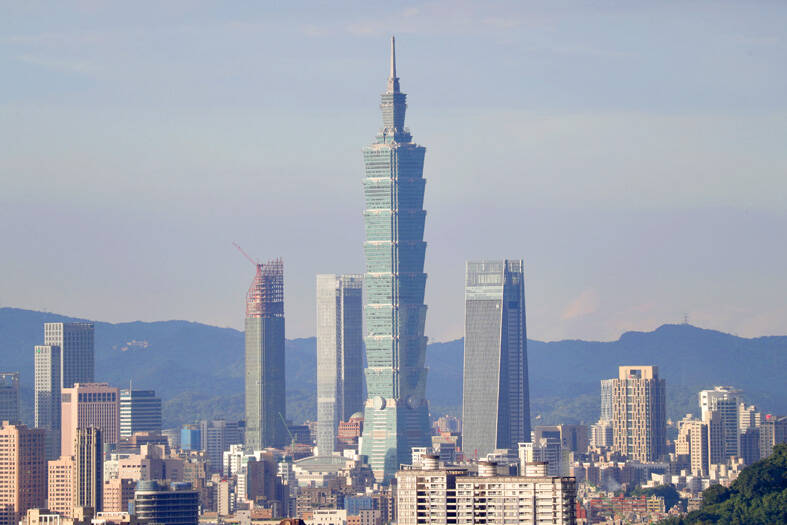Disappointing export figures have prompted the Chung-Hua Institution for Economic Research (CIER, 中華經濟研究院) to cut its economic growth forecast for the nation for this year to 1.6 percent from its previous estimate of 2.01 percent made in April.
“Taiwan’s economy will have difficulty growing 2 percent this year due to poor exports,” CIER president Yeh Chun-hsien (葉俊顯) told a news conference in Taipei yesterday.
Exports, the main growth driver of the local economy, have contracted for the past 10 months on an annual basis without any sign of recovery in the near future, the Ministry of Finance said earlier this month.

Photo: Ritchie B. Tongo / EPA-EFE
The Taipei-based think tank predicted that exports would shrink 7.13 percent from a year earlier this year, while imports would decrease by 9.97 percent.
Private investment, another major GDP component, would also prove a drag, with a 1.36 percent annual decline estimated for this year, as firms practice frugality and shun investment to mitigate the pain of sluggish business, Yeh said.
As a result, private consumption and government expenditures would become the major forces bolstering the nation’s economy, he said.
Faltering global demand for Taiwan-made goods and inventory destocking by firms have led several research institutions including CIER to downgrade the nation’s GDP growth forecast for this year to below 2 percent.
The Directorate-General of Budget, Accounting and Statistics could join the trend of downward revisions when it updates its growth forecast next month, after predicting 2.04 percent growth in May.
Chu Jung (儲蓉), a risk control chief at Farglory Life Insurance Co (遠雄人壽) and a business management professor, is more pessimistic, warning that Taiwan might struggle to eke out 1 percent GDP growth in light of weak economic data.
Poor exports have historically had a negative impact on domestic demand.
National Central University economics professor Yau Ruey (姚睿) shared the cautious sentiment, saying there is a limit to the growth momentum in private consumption.
It remains to be seen how long revenge consumption will be sustained if exports continue to suffer, analysts have said.
China is a key market for Taiwan’s exports and the economic slowdown in China poses a challenge, which has accounted for Taiwan’s declining reliance on the Chinese market, Yau said.
CIER expects consumer prices to grow 2.1 percent this year, slightly higher than the central bank’s 2 percent target. The job market would hold resilient with an unemployment rate of 3.59 percent, the institute said.
The think tank said Taiwan’s economy could grow 0.48 percent in the second quarter and 2.41 percent in the third before rebounding to 6.11 percent in the fourth quarter, as inventory adjustments are expected to come to an end while demand for artificial intelligence products is rising.

CHIP RACE: Three years of overbroad export controls drove foreign competitors to pursue their own AI chips, and ‘cost US taxpayers billions of dollars,’ Nvidia said China has figured out the US strategy for allowing it to buy Nvidia Corp’s H200s and is rejecting the artificial intelligence (AI) chip in favor of domestically developed semiconductors, White House AI adviser David Sacks said, citing news reports. US President Donald Trump on Monday said that he would allow shipments of Nvidia’s H200 chips to China, part of an administration effort backed by Sacks to challenge Chinese tech champions such as Huawei Technologies Co (華為) by bringing US competition to their home market. On Friday, Sacks signaled that he was uncertain about whether that approach would work. “They’re rejecting our chips,” Sacks

NATIONAL SECURITY: Intel’s testing of ACM tools despite US government control ‘highlights egregious gaps in US technology protection policies,’ a former official said Chipmaker Intel Corp has tested chipmaking tools this year from a toolmaker with deep roots in China and two overseas units that were targeted by US sanctions, according to two sources with direct knowledge of the matter. Intel, which fended off calls for its CEO’s resignation from US President Donald Trump in August over his alleged ties to China, got the tools from ACM Research Inc, a Fremont, California-based producer of chipmaking equipment. Two of ACM’s units, based in Shanghai and South Korea, were among a number of firms barred last year from receiving US technology over claims they have

It is challenging to build infrastructure in much of Europe. Constrained budgets and polarized politics tend to undermine long-term projects, forcing officials to react to emergencies rather than plan for the future. Not in Austria. Today, the country is to officially open its Koralmbahn tunnel, the 5.9 billion euro (US$6.9 billion) centerpiece of a groundbreaking new railway that will eventually run from Poland’s Baltic coast to the Adriatic Sea, transforming travel within Austria and positioning the Alpine nation at the forefront of logistics in Europe. “It is Austria’s biggest socio-economic experiment in over a century,” said Eric Kirschner, an economist at Graz-based Joanneum

OPTION: Uber said it could provide higher pay for batch trips, if incentives for batching is not removed entirely, as the latter would force it to pass on the costs to consumers Uber Technologies Inc yesterday warned that proposed restrictions on batching orders and minimum wages could prompt a NT$20 delivery fee increase in Taiwan, as lower efficiency would drive up costs. Uber CEO Dara Khosrowshahi made the remarks yesterday during his visit to Taiwan. He is on a multileg trip to the region, which includes stops in South Korea and Japan. His visit coincided the release last month of the Ministry of Labor’s draft bill on the delivery sector, which aims to safeguard delivery workers’ rights and improve their welfare. The ministry set the minimum pay for local food delivery drivers at